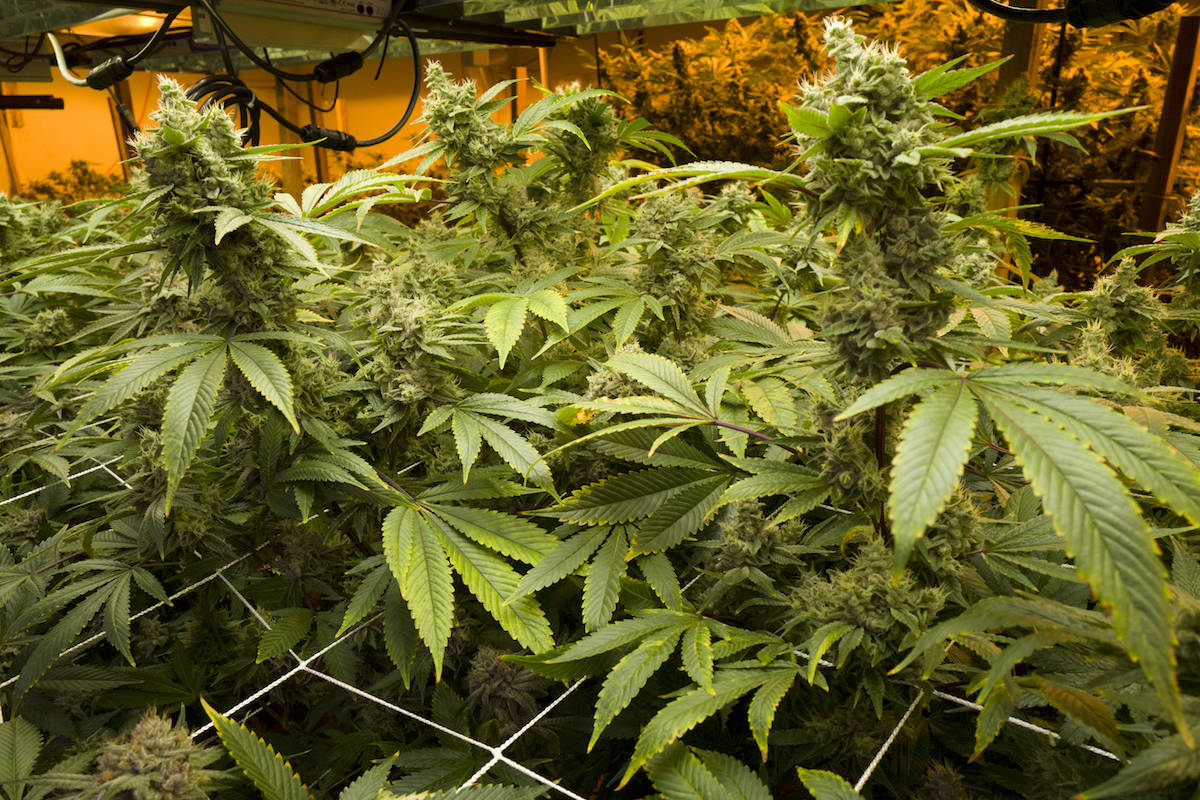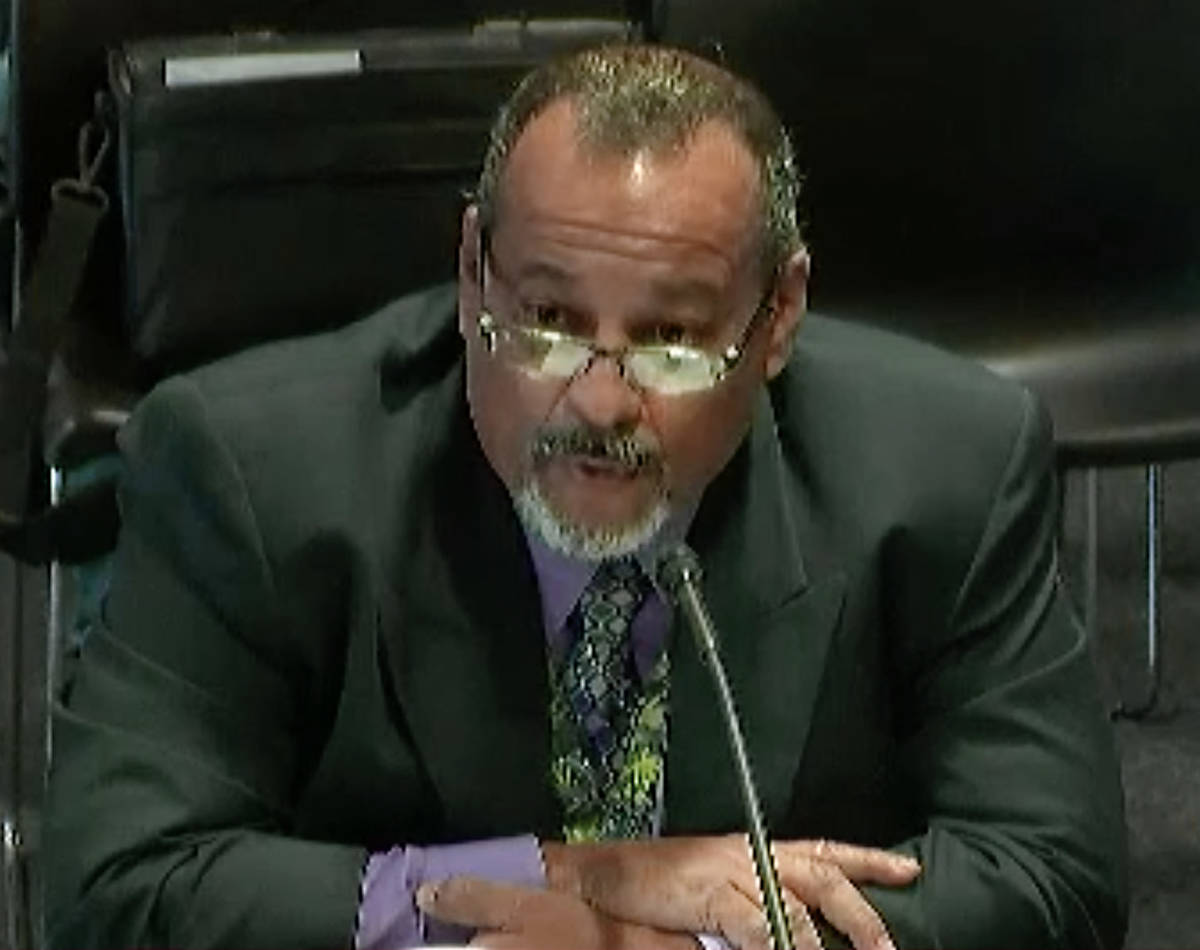Nevada marijuana licensing focus of federal investigation
FBI agents have been interviewing Nevada marijuana industry insiders over the past year to determine whether illegal influence played a role in the awarding of lucrative cannabis licenses, several people questioned by federal agents told the Review-Journal.
Authorities want to know if businesses or individuals attempted to sway politicians or bureaucrats with gifts, money, job offers or campaign contributions to obtain licenses.
Since Nevada’s 2016 vote to legalize recreational marijuana, the state’s licensing process has been embroiled in controversy and lawsuits. Applicants who failed to get licenses have leveled corruption charges against the applicants who obtained them. There also have been questions about whether pot companies with high-profile Nevada politicians and businessmen as partners had an advantage in getting licensing or zoning for the businesses.
The state has issued more than 750 licenses for dispensaries, cultivation, production, and testing, but 335 are dual licenses for medical and recreational pot at the same location.
Chad Christensen, a former lawmaker who co-owns Pisos Dispensary in Las Vegas, said he spent about 45 minutes with agents at the FBI’s office in mid-December discussing the licensing concerns.
“My gut told me and our Spidey sense is telling us there is a lot of ‘pay to play,’” Christensen said, adding he could not provide agents with specific evidence of corruption but discussed concerns about the licensing process.
Two other industry insiders, speaking on condition of anonymity because of concerns about repercussions from the FBI or interfering with the investigation, said they were interviewed in the past year. The agents asked about whether bribes or campaign contributions were used to influence the distribution of cannabis licenses, the sources said.
Public records show the Nevada attorney general’s office was notified on Feb. 18, 2020, of a joint Nevada Department of Public Safety and federal investigation. Additionally, DPS denied a Review-Journal records request last month seeking documents about their inquiries into licensing. The denial cited an ongoing criminal probe.
FBI spokeswoman Sandra Breault said the office doesn’t discuss investigations, and Matt Edwards, one of the agents who interviewed some of the sources, also declined to talk.
“I don’t comment on investigations and am not authorized to do that,” Edwards said. “I’m not going to have any conversation about FBI investigations.”
Tyler Klimas, executive director of the Nevada Cannabis Compliance Board, said he had not heard official word of a federal investigation but wouldn’t be surprised if there was one.
“It’s all about public trust and confidence,” he said. “As regulators of the state’s cannabis industry, it’s imperative that we work with our federal partners to ensure that trust and confidence extends outside of our borders and prevents any actions that could damage the state’s reputation or harm the industry.”
‘World War Weed’
Voters legalized medical marijuana in 2000, but it took more than a decade before regulations were in place to allow the first retail sales in 2015. A year later, in 2016, voters approved recreational pot sales. The first licenses for adult-use facilities went exclusively to businesses that already sold medical marijuana.
In 2018, 64 new licenses were up for grabs. The Nevada Department of Taxation received more than 460 applications from 127 groups and individuals for the new licenses, but awarded all of them to just 17 applicants. That process sparked a massive lawsuit, dubbed by some lawyers as “World War Weed,” that is being appealed to the state Supreme Court.
In response to the controversy, lawmakers transferred authority over marijuana in 2019 to a new Nevada Cannabis Compliance Board modeled after the state’s Gaming Control Board. The hope was the new agency would eliminate future controversy. The board will issue consumption lounge permits and in the future could oversee the distribution of new licenses for retail, growing and manufacturing if the Legislature makes more available.
High-profile politicians, many with no experience in retail or marijuana, also joined groups to obtain licenses and open marijuana businesses, raising questions about whether their clout influenced decisions.
Scott Sibley, publisher of the Nevada Legal News and part-owner of a Las Vegas dispensary and cultivation facility, said the word has been out in the industry about the investigation for some time, but it’s not clear whether investigators will find any wrongdoing.
“I think the feds are really taking a hard look at it,” said Sibley, who says he wasn’t interviewed by investigators but knows people who were. “I think this is their opportunity to make a big splash on this so it rocks everybody and people know not to pay for these licenses. It needs to be on the up and up.”
In March, the Chicago Tribune reported that Green Thumb Industries, which has approximately a dozen licenses in Nevada, was under federal investigation in Illinois for possible ‘“pay to play” in that state.
Green Thumb provided a news release disputing the accuracy of the Chicago Tribune story, calling it “baseless” and demanding a retraction. Company spokeswoman Grace Bondy declined to comment on any potential Nevada investigation of marijuana licensing, and there is no indication that Green Thumb is a focus of the Nevada FBI probe.
Source interviews
One source who spoke to the Review-Journal was interviewed in summer 2020.
FBI agents asked the source about specific politicians and whether the source saw anyone solicit or provide payments, gifts or campaign contributions in return for help obtaining licenses. The source told the agents that the source witnessed campaign contributions and one dispensary owner promising to raise $2 million for a candidate. But the source never witnessed a quid pro quo for a license.
The Review-Journal is withholding the names of politicians the FBI is alleged to have inquired about because no one has been charged, and investigators have appeared to stop asking about specific elected officials, according to Christensen and another source who were both interviewed more recently.
The source said agents expected the investigation to last about 18 months, meaning it could conclude around the end of this year. Edwards declined to comment on a timeline for the probe.
FBI agents interviewed a second source in April and asked whether there was “pay to play.”
“They were interested in talking about all licensing issues from a year ago plus,” the source said. The source showed the Review-Journal text exchanges with an agent but declined to provide the messages or any other documentation.
Christensen said the FBI did not ask about politicians but spent a considerable amount of time asking about the actions of former taxation department deputy director Jorge Pupo, who was put on leave and left the agency in 2019.
The agents would not answer Christensen’s questions about the investigation’s focus or provide a timeline for the end of the probe, he said.
Cannabis campaign cash
Nationwide, campaign contributions by marijuana interests to Nevada politicians are second only to donations to California candidates, according to an analysis by Opensecrets.org done at the Review-Journal’s request.
Since 2016, cannabis businesses, trade associations and individuals employed in the industry gave nearly $540,000 to local, state and federal politicians in Nevada, the analysis shows. California, which has more than 10 times the population, recorded about $800,000 in pot contributions in the same time period.
Gov. Steve Sisolak has received the most marijuana money since 2016, with more than $200,000 in contributions, followed by his primary challenger, former Clark County Commissioner Chris Giunchigliani, and Attorney General Aaron Ford, the data shows. The Nevada Dispensary Association, a trade group that advocates for state cannabis businesses, gave the most to candidates in the time period.
The contribution data is not comprehensive because Nevada doesn’t require donors to reveal their business interests, so small donations and money from people who have other primary businesses might not be part of the tally.
For example, an attorney, like suspended lawyer Brian Padgett, who also ran a dispensary, was counted as a lawyer and not a marijuana interest when he gave maximum donations through multiple entities during the 2018 campaign cycle to several candidates.
But Opensecrets links donors who give to federal campaigns or live in states that have an employment disclosure requirement in an attempt to capture as many pot-related donations as possible, said Opensecrets Deputy Research Director Pete Quist.
Massive court case
The 2018 lawsuit that worked its way through the court system for more than a year was filed by companies accusing state tax officials of bias in picking the winners from a pool of 462 applicants for new pot licenses.
In a September 2020 ruling, Judge Elizabeth Gonzalez repeatedly highlighted and questioned Pupo’s actions.
She ruled that there were significant irregularities in the state Department of Taxation’s licensing process but declined to change any ownerships.
The 30-page ruling took the taxation department to task for failing to vet licensees as required by the amendment that legalized pot, and failing to properly train temporary employees who were grading licensing applications. She also noted that Pupo met and dined with some licensees and allowed them to apply without securing a physical location — a significant benefit he did not reveal to other applicants. Pupo also testified in the case that he discussed job offers with marijuana licensees, but said he didn’t receive formal offers.
“The evidence establishes DoT’s deviations constituted arbitrary and capricious conduct without any rational basis for the deviation,” the judge wrote. But Gonzalez determined she didn’t have the power to require new licenses and there was no evidence that the entities that didn’t get the licenses would have if the rules were followed. Some of the litigants have appealed to the state Supreme Court.
Court documents and testimony say that Pupo was having dinners and private meetings with Las Vegas attorney Amanda Connor, who represents several dispensaries. Connor, reached this month, declined comment.
The state hired Las Vegas attorney Diane Welch to represent Pupo because the Nevada attorney general’s office determined that it had a conflict representing him after learning of a criminal investigation by DPS and the feds. Welch retired this month and Pupo and his current attorney, Pat Lundvall, did not return calls and emails seeking comment.
Records request denied
The state Department of Public Safety denied a Review-Journal request for records related to Pupo and its joint investigation with the federal government.
The “requested records are directly related to an ongoing criminal proceeding and many of the records will very likely be significant evidence in the criminal proceedings,” DPS staff wrote. “The interests against non-disclosure, at this time, include, but are not limited to, the following: (1) The records are directly relevant to the anticipated criminal proceedings; (2) release will undermine the rights of a defendant to a fair trial, (3) release will prejudice potential jurors in the anticipated criminal proceedings.”
Agency spokeswoman Kim Yoko Smith also declined to make staff available for an interview.
Klimas, of the Cannabis Compliance Board, said the agency’s current focus is figuring out the rules to license marijuana lounges, which lawmakers approved this year. He also wants to make sure there is no controversy in the industry.
“Looking back to 2018 it’s been pretty public how messy it was,” he said in an interview. “They can look back and think of a million things to do differently. It’s not surprising we are still dealing with that litigation.”
Contact Arthur Kane at akane@reviewjournal.com and follow @ArthurMKane on Twitter. Kane is a member of the Review-Journal’s investigative team, focusing on reporting that holds leaders and agencies accountable and exposes wrongdoing.
















